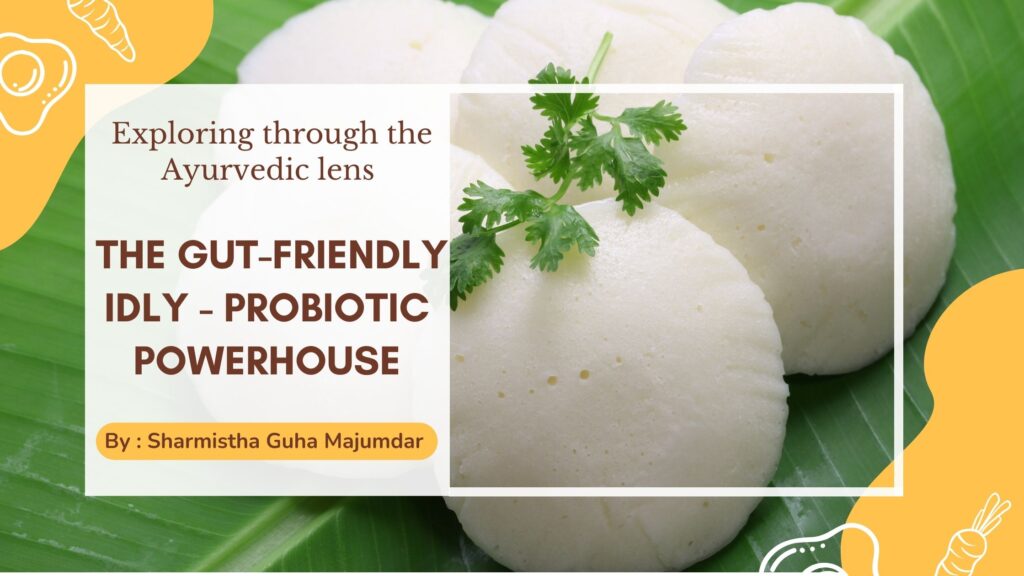Food & Nutrition, Health & Wellness
Exploring through the Ayurvedic lens- The Gut-Friendly Idly – Probiotic Powerhouse
Hey food enthusiasts!
Let’s dive into the delightful realm of idli, shall we? This South Indian delicacy isn’t just a treat for your taste buds; it’s a powerhouse of probiotics! Despite its unassuming appearance, idli packs a punch of good bacteria.
Imagine this: a blend of rice and urad lentils left to ferment naturally. During this process, friendly bacteria like lactobacilli and bifidobacteria work their magic, transforming idli into a gut-friendly superhero.
But why all the fuss about probiotics? Well, they’re like tiny superheroes for your digestive system! By regularly indulging in idli, you’re welcoming these friendly bugs into your gut, where they combat harmful pathogens, reduce inflammation, and alleviate any digestive discomfort you may experience.
But wait, there’s more! Idli isn’t just beneficial for your gut; it’s also a secret weapon for your immune system. A happy gut equals a robust immune system, and the probiotics in idli act as reinforcements, keeping your body primed to fend off infections and stay healthy.
Let’s now explore idli’s nutritional benefits through an Ayurvedic lens, shall we?
In Ayurveda, each person has a unique constitution known as dosha: Vata, Pitta, and Kapha. While idli generally benefits most body types, individuals with excess Pitta or Kapha doshas may need to be cautious or avoid it altogether.
For those with a dominant Vata dosha, idli offers several fantastic advantages:
- Grounding and Nourishing: With its base of rice and lentils, idli provides stable energy and helps stabilize Vata’s airy qualities.
- Easy Digestion: The fermentation process in idli breaks down carbohydrates and proteins, aiding digestion and alleviating issues like bloating and constipation.
- Moisture and Calmness: Idli’s moist texture counteracts Vata’s dryness, hydrating the body and calming the nerves, which can reduce feelings of anxiety and restlessness.
- Balanced Flavors: The sweet and salty tastes in idli help balance Vata dosha, supporting digestion without overwhelming Vata’s delicate balance.
However, for individuals with a Pitta dominance, the sour taste of fermented idli might exacerbate symptoms such as heartburn, acidity, inflammation, or skin irritations. Similarly, Kapha-dominant individuals might want to moderate idli intake due to its heavy and moist qualities, which can worsen traits like lethargy, sluggish digestion, and mucus buildup.
Let’s delve into some key aspects to make idli preparation and consumption more mindful and inclusive for everyone.
Instant Idli vs. Traditionally Fermented Idli:
Instant idli made with ingredients like urad dal flour, rice flour, curd, and fruit salts can be a convenient option when time is short. However, traditional fermentation offers the full benefits of probiotics, which might be lacking in instant versions. Opting for traditionally fermented idli ensures a higher probiotic content and better digestion. Instant idli can cause bloating, colic pain, and stomach distension for individuals with sensitive guts. The use of curd can further aggravate pitta in the system, causing acidity and loose stools.
Mitigating Pitta and Kapha Aggravations:
For Pitta-dominant individuals: Pairing idli with cooling accompaniments like curry leaves, coriander leaves chutney with little coconut without tempering of urad lentils and mustard seeds, and no sambar can help balance the sourness from fermentation, reducing the risk of aggravating symptoms like heartburn or acidity. Plain potato curry cooked in little ghee with no hot spices except a pinch of coriander powder, rock salt, and sugar can be greatly useful. An after drink of coconut water would neutralize the heat.
Kapha-dominant individuals: To mitigate the heavy and moist qualities of idli, balancing it with lighter accompaniments like spicy dry chutney powder can help counteract Kapha traits. Consuming idli in moderation and avoiding excessive oily or fried accompaniments is also advisable.
Enhancing Idli for All Doshas: Adding warming spices like ginger, cumin, or fenugreek seeds during fermentation or cooking can help make idli more suitable for all doshas by aiding digestion and balancing the qualities of the dish. Incorporating ingredients like grated vegetables or herbs can also enhance the nutritional value and customize idli according to individual dosha needs.
Dos and Don’ts While Preparing Idli:
Dos:
- Soak rice and lentils adequately before grinding to improve digestibility.
- Use filtered water for soaking and grinding to ensure purity.
- Ferment the batter in a warm, draft-free environment for optimal probiotic growth.
- Steam idlis thoroughly until they are cooked through.
Don’ts:
- Avoid over-fermenting the batter, as it can lead to an overly sour taste and may affect digestion.
- Don’t use chlorinated water for soaking or grinding, as it can inhibit fermentation and affect taste.
Frequency of Consuming Idli for Different Doshas:
- For Vata-dominant individuals: Consuming idli 4-5 times a week can provide nourishment and support digestion without overwhelming Vata’s delicate balance.
- For Pitta-dominant individuals: Limiting idli consumption to 1-2 times a week and balancing it with cooling accompaniments can help prevent the aggravation of Pitta symptoms.
- For Kapha-dominant individuals: Moderating idli intake to 1-2 times fortnight and choosing lighter, spicy accompaniments can help prevent the exacerbation of Kapha traits and support balanced digestion.
In essence, idli isn’t just a delicious dish – it’s a nutritional gem packed with probiotics. Whether supporting digestion or boosting immunity, idli’s probiotic content makes it a valuable addition to any diet. So why not indulge in some idli goodness and give your gut the love it deserves? Your taste buds and your tummy will thank you!

